2022年九年级中考英语语法知识梳理-宾语从句学案(含答案)
文档属性
| 名称 | 2022年九年级中考英语语法知识梳理-宾语从句学案(含答案) | 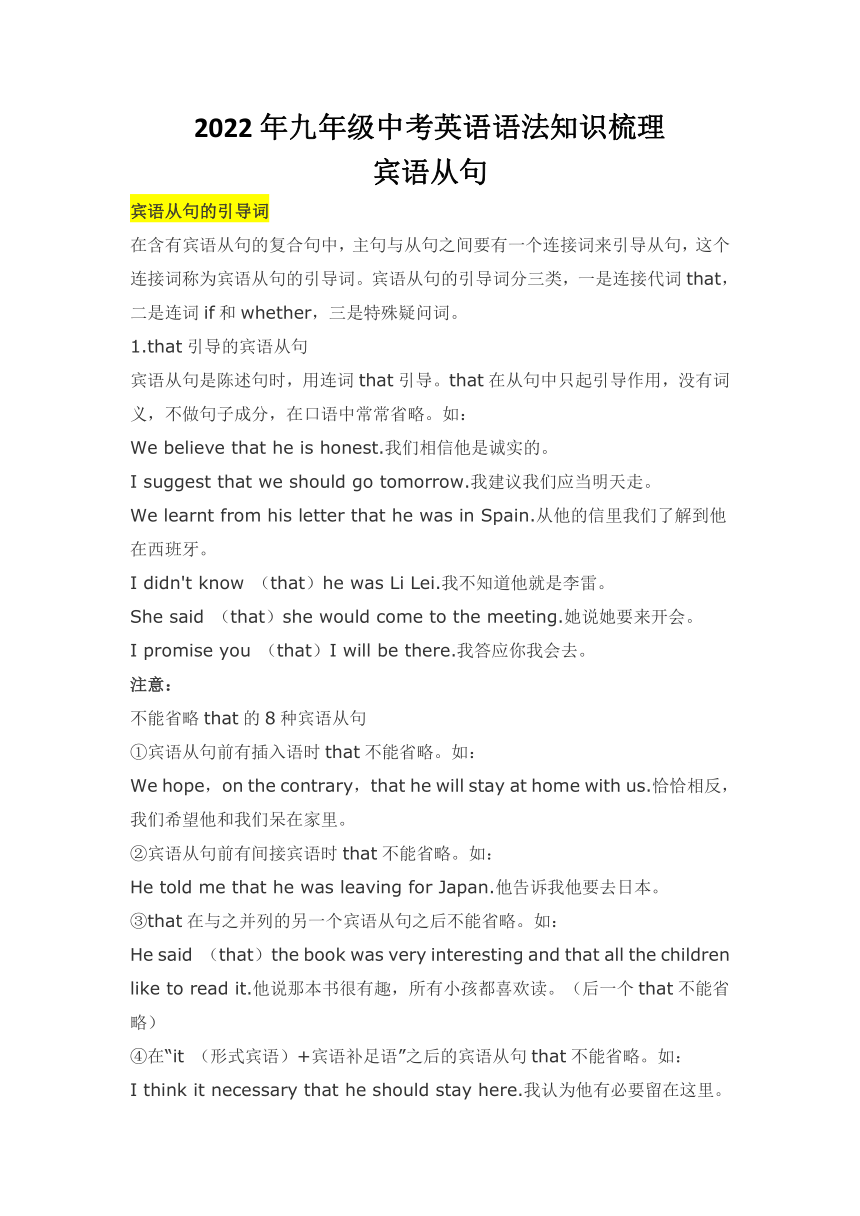 | |
| 格式 | zip | ||
| 文件大小 | 28.5KB | ||
| 资源类型 | 教案 | ||
| 版本资源 | 人教新目标(Go for it)版 | ||
| 科目 | 英语 | ||
| 更新时间 | 2022-03-18 23:38:22 | ||
图片预览

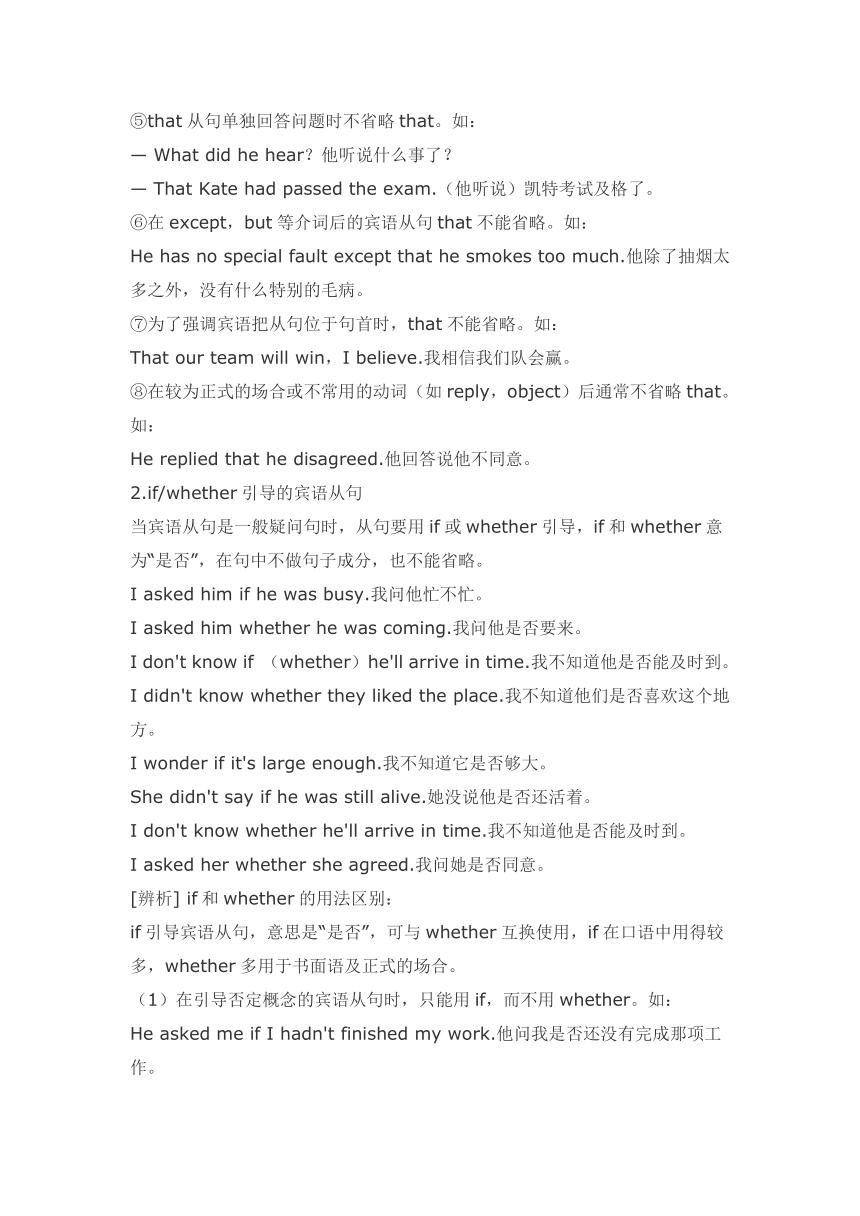
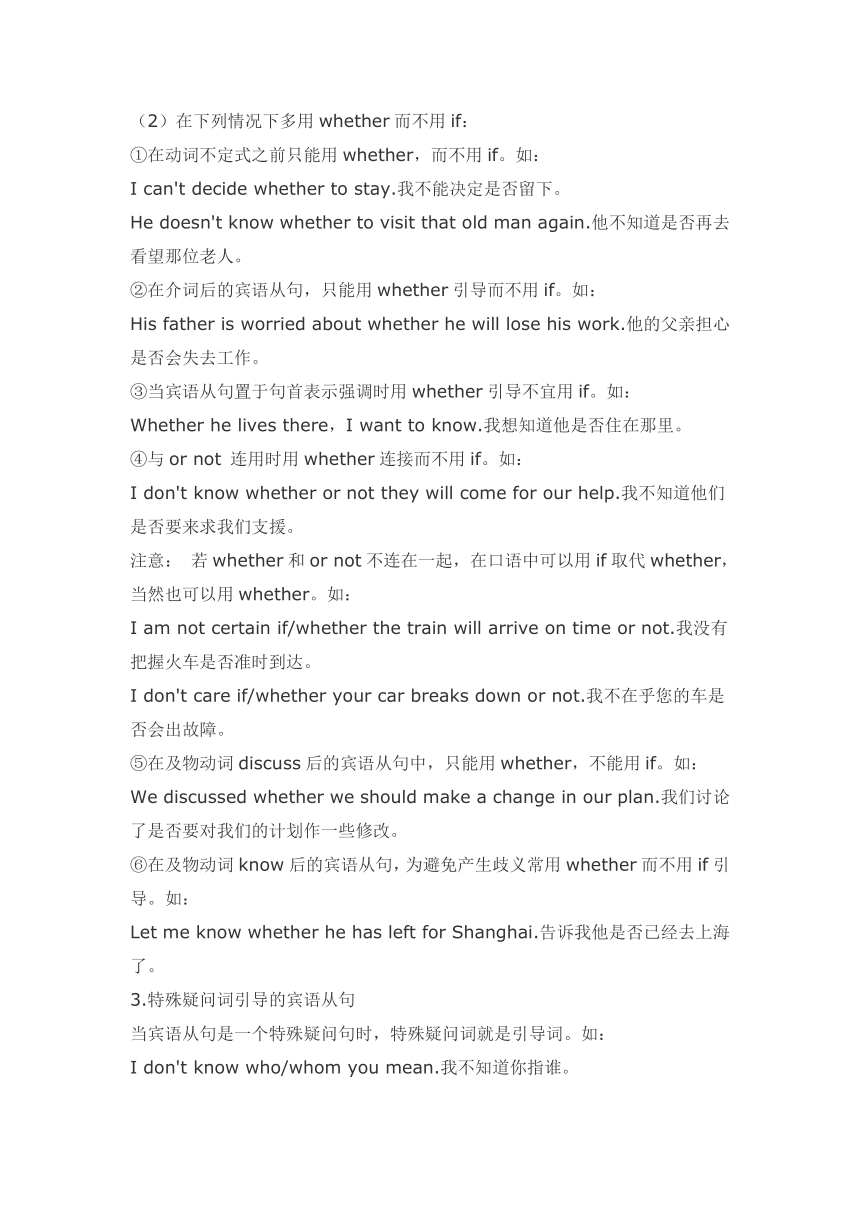
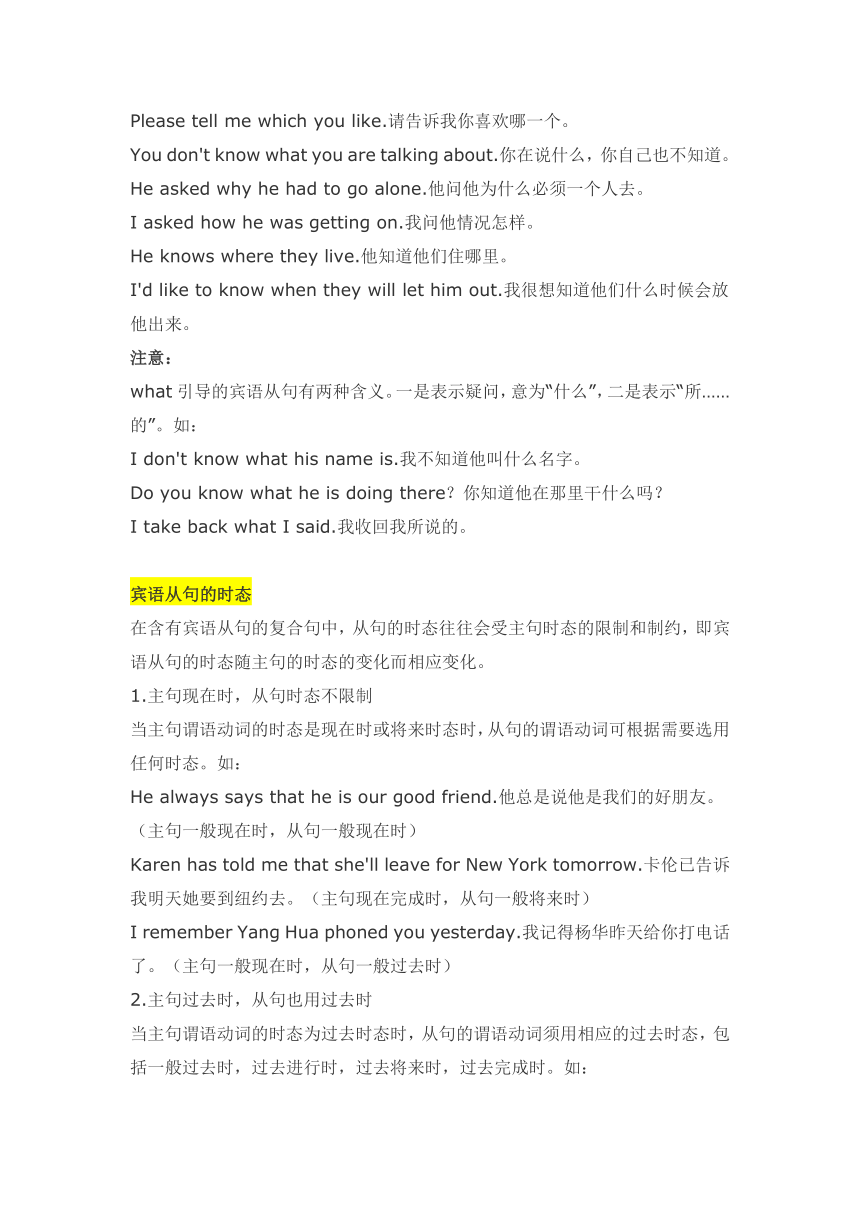
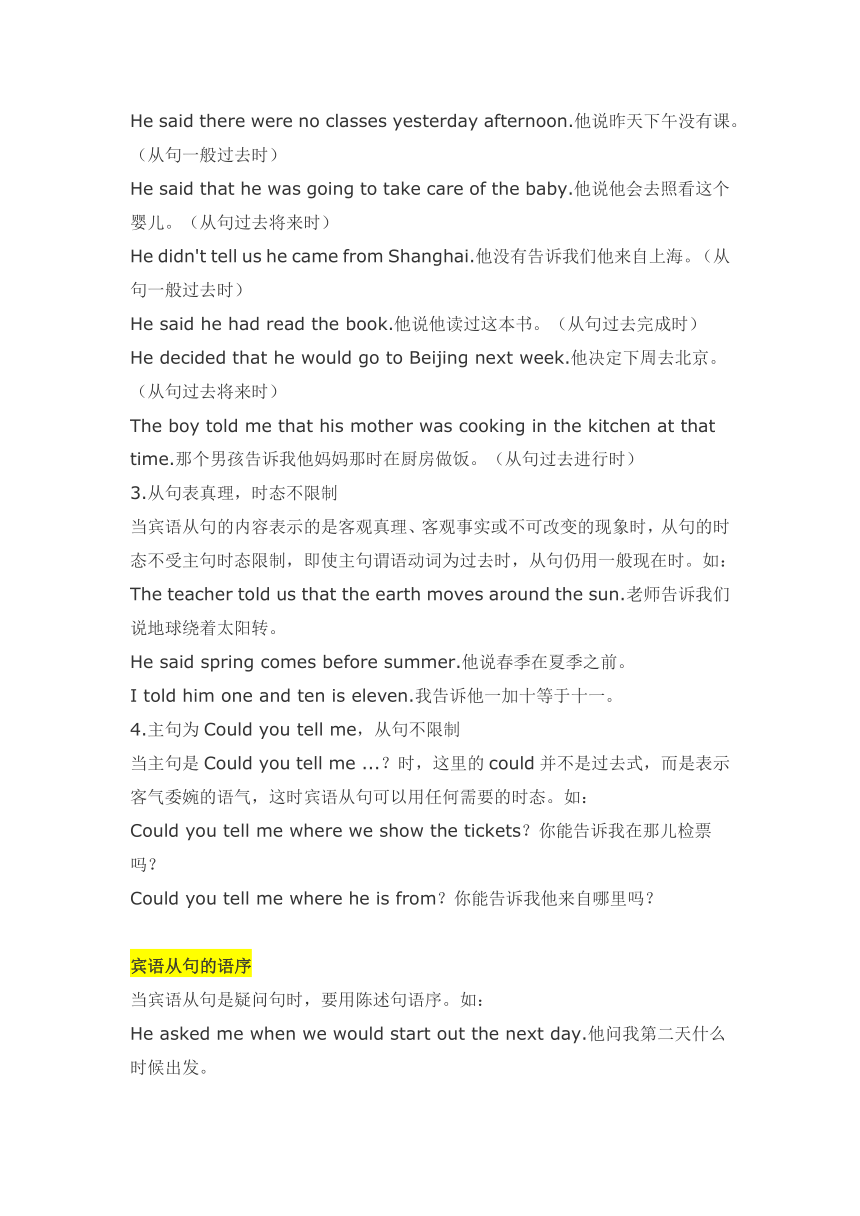
文档简介
2022年九年级中考英语语法知识梳理
宾语从句
宾语从句的引导词
在含有宾语从句的复合句中,主句与从句之间要有一个连接词来引导从句,这个连接词称为宾语从句的引导词。宾语从句的引导词分三类,一是连接代词that,二是连词if和whether,三是特殊疑问词。
1.that引导的宾语从句
宾语从句是陈述句时,用连词that引导。that在从句中只起引导作用,没有词义,不做句子成分,在口语中常常省略。如:
We believe that he is honest.我们相信他是诚实的。
I suggest that we should go tomorrow.我建议我们应当明天走。
We learnt from his letter that he was in Spain.从他的信里我们了解到他在西班牙。
I didn't know (that)he was Li Lei.我不知道他就是李雷。
She said (that)she would come to the meeting.她说她要来开会。
I promise you (that)I will be there.我答应你我会去。
注意:
不能省略that的8种宾语从句
①宾语从句前有插入语时that不能省略。如:
We hope,on the contrary,that he will stay at home with us.恰恰相反,我们希望他和我们呆在家里。
②宾语从句前有间接宾语时that不能省略。如:
He told me that he was leaving for Japan.他告诉我他要去日本。
③that在与之并列的另一个宾语从句之后不能省略。如:
He said (that)the book was very interesting and that all the children like to read it.他说那本书很有趣,所有小孩都喜欢读。(后一个that不能省略)
④在“it (形式宾语)+宾语补足语”之后的宾语从句that不能省略。如:
I think it necessary that he should stay here.我认为他有必要留在这里。
⑤that从句单独回答问题时不省略that。如:
— What did he hear?他听说什么事了?
— That Kate had passed the exam.(他听说)凯特考试及格了。
⑥在except,but等介词后的宾语从句that不能省略。如:
He has no special fault except that he smokes too much.他除了抽烟太多之外,没有什么特别的毛病。
⑦为了强调宾语把从句位于句首时,that不能省略。如:
That our team will win,I believe.我相信我们队会赢。
⑧在较为正式的场合或不常用的动词(如reply,object)后通常不省略that。如:
He replied that he disagreed.他回答说他不同意。
2.if/whether引导的宾语从句
当宾语从句是一般疑问句时,从句要用if或whether引导,if和whether意为“是否”,在句中不做句子成分,也不能省略。
I asked him if he was busy.我问他忙不忙。
I asked him whether he was coming.我问他是否要来。
I don't know if (whether)he'll arrive in time.我不知道他是否能及时到。
I didn't know whether they liked the place.我不知道他们是否喜欢这个地方。
I wonder if it's large enough.我不知道它是否够大。
She didn't say if he was still alive.她没说他是否还活着。
I don't know whether he'll arrive in time.我不知道他是否能及时到。
I asked her whether she agreed.我问她是否同意。
[辨析] if和whether的用法区别:
if引导宾语从句,意思是“是否”,可与whether互换使用,if在口语中用得较多,whether多用于书面语及正式的场合。
(1)在引导否定概念的宾语从句时,只能用if,而不用whether。如:
He asked me if I hadn't finished my work.他问我是否还没有完成那项工作。
(2)在下列情况下多用whether而不用if:
①在动词不定式之前只能用whether,而不用if。如:
I can't decide whether to stay.我不能决定是否留下。
He doesn't know whether to visit that old man again.他不知道是否再去看望那位老人。
②在介词后的宾语从句,只能用whether引导而不用if。如:
His father is worried about whether he will lose his work.他的父亲担心是否会失去工作。
③当宾语从句置于句首表示强调时用whether引导不宜用if。如:
Whether he lives there,I want to know.我想知道他是否住在那里。
④与or not 连用时用whether连接而不用if。如:
I don't know whether or not they will come for our help.我不知道他们是否要来求我们支援。
注意: 若whether和or not不连在一起,在口语中可以用if取代whether,当然也可以用whether。如:
I am not certain if/whether the train will arrive on time or not.我没有把握火车是否准时到达。
I don't care if/whether your car breaks down or not.我不在乎您的车是否会出故障。
⑤在及物动词discuss后的宾语从句中,只能用whether,不能用if。如:
We discussed whether we should make a change in our plan.我们讨论了是否要对我们的计划作一些修改。
⑥在及物动词know后的宾语从句,为避免产生歧义常用whether而不用if引导。如:
Let me know whether he has left for Shanghai.告诉我他是否已经去上海了。
3.特殊疑问词引导的宾语从句
当宾语从句是一个特殊疑问句时,特殊疑问词就是引导词。如:
I don't know who/whom you mean.我不知道你指谁。
Please tell me which you like.请告诉我你喜欢哪一个。
You don't know what you are talking about.你在说什么,你自己也不知道。
He asked why he had to go alone.他问他为什么必须一个人去。
I asked how he was getting on.我问他情况怎样。
He knows where they live.他知道他们住哪里。
I'd like to know when they will let him out.我很想知道他们什么时候会放他出来。
注意:
what引导的宾语从句有两种含义。一是表示疑问,意为“什么”,二是表示“所……的”。如:
I don't know what his name is.我不知道他叫什么名字。
Do you know what he is doing there?你知道他在那里干什么吗?
I take back what I said.我收回我所说的。
宾语从句的时态
在含有宾语从句的复合句中,从句的时态往往会受主句时态的限制和制约,即宾语从句的时态随主句的时态的变化而相应变化。
1.主句现在时,从句时态不限制
当主句谓语动词的时态是现在时或将来时态时,从句的谓语动词可根据需要选用任何时态。如:
He always says that he is our good friend.他总是说他是我们的好朋友。(主句一般现在时,从句一般现在时)
Karen has told me that she'll leave for New York tomorrow.卡伦已告诉我明天她要到纽约去。(主句现在完成时,从句一般将来时)
I remember Yang Hua phoned you yesterday.我记得杨华昨天给你打电话了。(主句一般现在时,从句一般过去时)
2.主句过去时,从句也用过去时
当主句谓语动词的时态为过去时态时,从句的谓语动词须用相应的过去时态,包括一般过去时,过去进行时,过去将来时,过去完成时。如:
He said there were no classes yesterday afternoon.他说昨天下午没有课。(从句一般过去时)
He said that he was going to take care of the baby.他说他会去照看这个婴儿。(从句过去将来时)
He didn't tell us he came from Shanghai.他没有告诉我们他来自上海。(从句一般过去时)
He said he had read the book.他说他读过这本书。(从句过去完成时)
He decided that he would go to Beijing next week.他决定下周去北京。(从句过去将来时)
The boy told me that his mother was cooking in the kitchen at that time.那个男孩告诉我他妈妈那时在厨房做饭。(从句过去进行时)
3.从句表真理,时态不限制
当宾语从句的内容表示的是客观真理、客观事实或不可改变的现象时,从句的时态不受主句时态限制,即使主句谓语动词为过去时,从句仍用一般现在时。如:
The teacher told us that the earth moves around the sun.老师告诉我们说地球绕着太阳转。
He said spring comes before summer.他说春季在夏季之前。
I told him one and ten is eleven.我告诉他一加十等于十一。
4.主句为Could you tell me,从句不限制
当主句是Could you tell me ...?时,这里的could并不是过去式,而是表示客气委婉的语气,这时宾语从句可以用任何需要的时态。如:
Could you tell me where we show the tickets?你能告诉我在那儿检票吗?
Could you tell me where he is from?你能告诉我他来自哪里吗?
宾语从句的语序
当宾语从句是疑问句时,要用陈述句语序。如:
He asked me when we would start out the next day.他问我第二天什么时候出发。
Did you find out where she lost her car?你查出了她在哪里丢的车吗?
(误)I don't know where has she gone.我不知道她去哪里了。
(正)I don't know where she has gone.我不知道她去哪里了。
(误)Do you know what is he doing?你知道他在干什么吗?
(正)Do you know what he is doing?你知道他在干什么吗?
(误)I don't know how does he go to school.我不知道他怎样上学。
(正)I don't know how he goes to school.我不知道他怎样上学。
宾语从句的否定转移
当主句谓语动词是think,believe,suppose,expect,imagine等,后接一个表示否定意义的宾语从句时,其否定通常转移到主语:如:
I don't suppose that it is true.我认为那不是真的。
I don't imagine that he will come.我想他不会来的。
I don't think we need waste much time on it.我想我们不必在这上面花太多时间
We didn't think we'd be this late.我们没想到我们会到得这么晚。
I don't suppose I'll trouble you again.我想我不要再麻烦你了。
注意:
在反意疑问句中,这种否定转移的复合句在进行反意疑问时,助动词和相应代词要与从句一致,而且用肯定式。如:
I don't think the boy is clever,is he?我认为那个男孩不聪明,是吗?
I don't believe it will rain tomorrow,will it?我相信明天不会下雨,是吗?
宾语从句的简化
宾语从句在许多情况下可以简化为动词不定式的形式而所表达的意思不变,这种由较复杂的宾语从句转化为简单句的过程称为宾语从句的简化。宾语从句的简化主要有以下几种情况。
1.由宾语从句简化为动词不定式
当主句的谓语动词是hope,decide,wish,choose,agree,promise等,且宾语从句的主语与主句主语一致时,宾语从句可简化为不定式结构。如:
Li Ming hopes he will be back very soon.李明希望他很快回来。
→Li Ming hopes to be back very soon.李明希望很快回来。
We decided that we would help him.我们决定来帮助他。
→We decided to help him.我们决定帮助他。
2.由宾语从句简化为“疑问词+不定式”结构
当主句谓语动词是know,learn,remember,forget,tell等动词,从句由特殊疑问词引导,且主句主语与从句主语一致时,宾语从句可简化为“疑问词+不定式”结构。如:
She has forgotten how she can open the window.她已忘记她怎样才能打开窗子。
→She has forgotten how to open the window.她已忘记怎样打开窗子。
注意:
当主句谓语动词是tell,ask,show,teach等动词,且后带双宾语,从句主语和间接宾语一致,而且从句由特殊疑问词引导时,宾语从句也可简化为“疑问词+不定式”结构。如:
Could you tell me how I can get to the station?你能告诉我怎样到达火车站吗?
→Could you tell me how to get to the station?你能告诉我怎样到达火车站吗?
3.由宾语从句简化为“动词+sb.to do”结构
当主句的谓语动词是order(命令),require(需要),ask(要求),advise(建议)等时,如果主句和从句的主语不一致,宾语从句可简化为“名词(代词)+不定式”结构。如:
The headmaster ordered that we should start at once.校长命令我们马上开始。
→The headmaster ordered us to start at once.校长命令我们马上开始。
4.由宾语从句简化为“动词+介词+动名词”形式
某些动词后的宾语从句,可以用介词加动名词(短语)等其他形式简化。如:
He insisted that he should go with us.他坚持与我们一起去。
→He insisted on going with us.他坚持与我们一起去。
5.由宾语从句简化为“宾语+V-ing(宾语补足语)”结构
某些动词后面的宾语从句可转化为“宾语+V-ing形式(作宾语补足语)”结构。如:
Liu Ping found that there was a wallet lying on the ground.刘萍发现有个钱包在地上。
→Liu Ping found a wallet lying on the ground.刘萍发现地上有一个钱包。
6.其他宾语从句简化句型
还有一些动词由复合句变为简单句时,其句型需要进行适当的变化。如:
(1)It seemed that+从句变为:It seemed to do句型。如:
It seemed that the boys were going to win.看起来好像男孩子要赢。
→The boys seemed to win.男孩子似乎要赢。
(2)...find that it is+形容词+to do sth.变为:...find it+形容词+to do sth.
I found that it was difficult to learn English well.我发现学好英语很难。
→I found it difficult to learn English well.我发现学好英语很难。
(3)...find that+系表结构变为:...find+名词+形容词(作宾补)。如:
Soon we found that the ground was covered with thick snow.很快我们发现地面被厚厚的雪覆盖。
→Soon we found the ground covered with thick snow.很快我们发现地面被厚厚的雪覆盖。
They found that the box was very heavy.他们发现箱子很重。
→They found the box very heavy.他们发现箱子很重。
【习题速递】
1.— Can you tell me _____?
— He lives in Shanghai.
A.where Mark lives B.where does Mark live
C.where Mark lived D.where did Mark live
2. — Look at the stone bridge!Do you know _____ it was built?
— In the 1860s.It is quite old.
A.when B.how C.where D.why
3.What a lovely toy race car!Could you tell me _____?
A.why did you get it B.when will you get it
C.where you got it D.how will you get it
4. — Are you going camping this afternoon?
— A typhoon is coming.I'm not sure _____ the road to the mountains will be closed.
A.which B.what C.whether D.why
5. — What did the teacher say to you?
— He asked me _____.
A.why I look unhappy then B.when did I go home last night
C.how could I solve the problem D.if I had got everything ready
6.Yesterday the teacher told us the earth _____ the sun.
A.goes around B.went around
C.is going around D.would go around
7. I don't think the newly directed film by Zhao Wei is as interesting as people say,_____.
A.do I B.don't I C.is it D.isn't it
8. — Could you tell me _____ every morning?
— Sure.I have to catch the school bus.
A.why you get up early B.why do you get up early
C.why did you get up early D.why you got up early
【答案点拨】
1.答案:A 句意:“你能告诉我马克住哪吗?”“他住在上海。”由问句“can you tell me”可知其后是一个宾语从句,要用陈述语序;由答句“he lives”可知从句用一般现在时。故选 A。
2.答案:A 句意:“看这座石头桥!你知道它是什么时候建造的吗?”“在19世纪60年代,它非常古老。”由答语可知上句问的是时间,用when引导宾语从句。故选A。
3.答案:C 句意:多漂亮的玩具赛车啊!你可以告诉我你在哪里买的吗?宾语从句要用陈述句语序,故选C。
4.答案:C 句意:“今天下午,你将去野营吗?”“台风就要来了。我不能确定通往山里的道路是否关闭。”由句中的“不能确定”可知,宾语从句为“是否关闭”。故选C。
5.答案:D 句意:“老师对你说了些什么?”“他问我我是否准备好了一切。”宾语从句疑问句要用陈述句语序,排除B、C选项;由主句asked可知,主句用了过去时,从句也用过去时,故选D。
6.答案:A 句意:昨天老师告诉我们地球绕着太阳转。在宾语从句中,从句如果描述的是客观真理,那么不管主句是什么时态,从句要用一般现在时。故选A。
7.答案:C 根据句意“我认为由赵薇导演的新电影并没有如人们说的一样有趣?” think后接宾语从句,反意疑问句中的简短问句与宾语从句一致;否定式与主句一致,用肯定式。故选C。
8.答案:A 宾语从句的语序为陈述句语序,排除B、C;Could you tell ...?是一种委婉的表达法,从every morning及答语知,谈话双方说的是现在的事情,宾语从句用一般现在时态。故选A。
【语法专练 体验中考】
1. — Do you know _____?
— Let me see.I remember it was on March 18th .
A.why did they move here B.why they moved here
C.when did they move here D.when they moved here
2. — Excuse me,do you know _____ yesterday?
— Sure.It closed at 6:00 p.m.yesterday.
A.when the bookstore closes B.when does the bookstore close
C.when the bookstore closed D.when did the bookstore close
3. — Father's Day is coming.Shall we make a card for Dad?
— Good idea!But would you please show me _____ as I know little about DIY?
A.why B.when C.how D.where
4.Could you tell me _____ the beautiful mobile phone?I want to buy one,too.
A.when did you buy B.when you bought
C.where you bought D.where did you buy
5.— Could you tell me _____ you'll go to Paris?
— Next month.
A.why B.where C.when D.how
6.My neighbor asked me _____ I heard the big noise last night or not.
A.whether B.if C.what
7.— I haven't seen your English teacher for a week.Where is he?
— Sorry,I don't know _____.
A.where has he been B.where he has been
C.where has he gone D.where he has gone
8. — I wonder _____.
— It will fall on a Saturday.
A.how will National Day fall on this year
B.how National Day will fall on this year
C.what day will National Day fall on this year
D.what day National Day will fall on this year
9. — The movie star,Zhao Yazhi,looks so young.
— So she does.I can't really tell _____ .
A.how old is she B.how old she is
C.how is she old
10. — Li Mei,do you know _____?
— Well,she likes The Voice of China .
A.what TV show does your English teacher like
B.what TV show your English teacher likes
C.what TV show did your English teacher like
D.what TV show your English teacher liked
11.— What did Tom say to you just now,John?
— He asked _____.
A.why I am so happy today
B.what will I do for the weekend
C.who did I play football with after school
D.if I could go to the movie with him tonight
12. — Could you tell me _____ yesterday?
— Because it rained heavily.
A.why you arrived late B.why did you arrive late
C.why you didn't arrive late
13. They solved the problem in the end.Yet I really don't know _____.
A.how did they make it B.how they made it
C.why did they make it
14. — Do you know _____?
— Yes.They're from New York.
A.what do the tourists do B.where the tourists are from
C.what the tourists do D.where are the tourists from
15.— I am worried about _____.
— Whatever the result is,don't be too hard on yourself.
A.how have I prepared for my final exams
B.if I can get great grades in the final exams
C.that my school team lost the game because of my fault
D.why did my school team lose the game
【答案速递】
1.D 2.C 3.C 4.C 5.C 6.A 7.D 8.D 9.B 10.B 11.D 12.A 13.B 14.B 15.B
宾语从句
宾语从句的引导词
在含有宾语从句的复合句中,主句与从句之间要有一个连接词来引导从句,这个连接词称为宾语从句的引导词。宾语从句的引导词分三类,一是连接代词that,二是连词if和whether,三是特殊疑问词。
1.that引导的宾语从句
宾语从句是陈述句时,用连词that引导。that在从句中只起引导作用,没有词义,不做句子成分,在口语中常常省略。如:
We believe that he is honest.我们相信他是诚实的。
I suggest that we should go tomorrow.我建议我们应当明天走。
We learnt from his letter that he was in Spain.从他的信里我们了解到他在西班牙。
I didn't know (that)he was Li Lei.我不知道他就是李雷。
She said (that)she would come to the meeting.她说她要来开会。
I promise you (that)I will be there.我答应你我会去。
注意:
不能省略that的8种宾语从句
①宾语从句前有插入语时that不能省略。如:
We hope,on the contrary,that he will stay at home with us.恰恰相反,我们希望他和我们呆在家里。
②宾语从句前有间接宾语时that不能省略。如:
He told me that he was leaving for Japan.他告诉我他要去日本。
③that在与之并列的另一个宾语从句之后不能省略。如:
He said (that)the book was very interesting and that all the children like to read it.他说那本书很有趣,所有小孩都喜欢读。(后一个that不能省略)
④在“it (形式宾语)+宾语补足语”之后的宾语从句that不能省略。如:
I think it necessary that he should stay here.我认为他有必要留在这里。
⑤that从句单独回答问题时不省略that。如:
— What did he hear?他听说什么事了?
— That Kate had passed the exam.(他听说)凯特考试及格了。
⑥在except,but等介词后的宾语从句that不能省略。如:
He has no special fault except that he smokes too much.他除了抽烟太多之外,没有什么特别的毛病。
⑦为了强调宾语把从句位于句首时,that不能省略。如:
That our team will win,I believe.我相信我们队会赢。
⑧在较为正式的场合或不常用的动词(如reply,object)后通常不省略that。如:
He replied that he disagreed.他回答说他不同意。
2.if/whether引导的宾语从句
当宾语从句是一般疑问句时,从句要用if或whether引导,if和whether意为“是否”,在句中不做句子成分,也不能省略。
I asked him if he was busy.我问他忙不忙。
I asked him whether he was coming.我问他是否要来。
I don't know if (whether)he'll arrive in time.我不知道他是否能及时到。
I didn't know whether they liked the place.我不知道他们是否喜欢这个地方。
I wonder if it's large enough.我不知道它是否够大。
She didn't say if he was still alive.她没说他是否还活着。
I don't know whether he'll arrive in time.我不知道他是否能及时到。
I asked her whether she agreed.我问她是否同意。
[辨析] if和whether的用法区别:
if引导宾语从句,意思是“是否”,可与whether互换使用,if在口语中用得较多,whether多用于书面语及正式的场合。
(1)在引导否定概念的宾语从句时,只能用if,而不用whether。如:
He asked me if I hadn't finished my work.他问我是否还没有完成那项工作。
(2)在下列情况下多用whether而不用if:
①在动词不定式之前只能用whether,而不用if。如:
I can't decide whether to stay.我不能决定是否留下。
He doesn't know whether to visit that old man again.他不知道是否再去看望那位老人。
②在介词后的宾语从句,只能用whether引导而不用if。如:
His father is worried about whether he will lose his work.他的父亲担心是否会失去工作。
③当宾语从句置于句首表示强调时用whether引导不宜用if。如:
Whether he lives there,I want to know.我想知道他是否住在那里。
④与or not 连用时用whether连接而不用if。如:
I don't know whether or not they will come for our help.我不知道他们是否要来求我们支援。
注意: 若whether和or not不连在一起,在口语中可以用if取代whether,当然也可以用whether。如:
I am not certain if/whether the train will arrive on time or not.我没有把握火车是否准时到达。
I don't care if/whether your car breaks down or not.我不在乎您的车是否会出故障。
⑤在及物动词discuss后的宾语从句中,只能用whether,不能用if。如:
We discussed whether we should make a change in our plan.我们讨论了是否要对我们的计划作一些修改。
⑥在及物动词know后的宾语从句,为避免产生歧义常用whether而不用if引导。如:
Let me know whether he has left for Shanghai.告诉我他是否已经去上海了。
3.特殊疑问词引导的宾语从句
当宾语从句是一个特殊疑问句时,特殊疑问词就是引导词。如:
I don't know who/whom you mean.我不知道你指谁。
Please tell me which you like.请告诉我你喜欢哪一个。
You don't know what you are talking about.你在说什么,你自己也不知道。
He asked why he had to go alone.他问他为什么必须一个人去。
I asked how he was getting on.我问他情况怎样。
He knows where they live.他知道他们住哪里。
I'd like to know when they will let him out.我很想知道他们什么时候会放他出来。
注意:
what引导的宾语从句有两种含义。一是表示疑问,意为“什么”,二是表示“所……的”。如:
I don't know what his name is.我不知道他叫什么名字。
Do you know what he is doing there?你知道他在那里干什么吗?
I take back what I said.我收回我所说的。
宾语从句的时态
在含有宾语从句的复合句中,从句的时态往往会受主句时态的限制和制约,即宾语从句的时态随主句的时态的变化而相应变化。
1.主句现在时,从句时态不限制
当主句谓语动词的时态是现在时或将来时态时,从句的谓语动词可根据需要选用任何时态。如:
He always says that he is our good friend.他总是说他是我们的好朋友。(主句一般现在时,从句一般现在时)
Karen has told me that she'll leave for New York tomorrow.卡伦已告诉我明天她要到纽约去。(主句现在完成时,从句一般将来时)
I remember Yang Hua phoned you yesterday.我记得杨华昨天给你打电话了。(主句一般现在时,从句一般过去时)
2.主句过去时,从句也用过去时
当主句谓语动词的时态为过去时态时,从句的谓语动词须用相应的过去时态,包括一般过去时,过去进行时,过去将来时,过去完成时。如:
He said there were no classes yesterday afternoon.他说昨天下午没有课。(从句一般过去时)
He said that he was going to take care of the baby.他说他会去照看这个婴儿。(从句过去将来时)
He didn't tell us he came from Shanghai.他没有告诉我们他来自上海。(从句一般过去时)
He said he had read the book.他说他读过这本书。(从句过去完成时)
He decided that he would go to Beijing next week.他决定下周去北京。(从句过去将来时)
The boy told me that his mother was cooking in the kitchen at that time.那个男孩告诉我他妈妈那时在厨房做饭。(从句过去进行时)
3.从句表真理,时态不限制
当宾语从句的内容表示的是客观真理、客观事实或不可改变的现象时,从句的时态不受主句时态限制,即使主句谓语动词为过去时,从句仍用一般现在时。如:
The teacher told us that the earth moves around the sun.老师告诉我们说地球绕着太阳转。
He said spring comes before summer.他说春季在夏季之前。
I told him one and ten is eleven.我告诉他一加十等于十一。
4.主句为Could you tell me,从句不限制
当主句是Could you tell me ...?时,这里的could并不是过去式,而是表示客气委婉的语气,这时宾语从句可以用任何需要的时态。如:
Could you tell me where we show the tickets?你能告诉我在那儿检票吗?
Could you tell me where he is from?你能告诉我他来自哪里吗?
宾语从句的语序
当宾语从句是疑问句时,要用陈述句语序。如:
He asked me when we would start out the next day.他问我第二天什么时候出发。
Did you find out where she lost her car?你查出了她在哪里丢的车吗?
(误)I don't know where has she gone.我不知道她去哪里了。
(正)I don't know where she has gone.我不知道她去哪里了。
(误)Do you know what is he doing?你知道他在干什么吗?
(正)Do you know what he is doing?你知道他在干什么吗?
(误)I don't know how does he go to school.我不知道他怎样上学。
(正)I don't know how he goes to school.我不知道他怎样上学。
宾语从句的否定转移
当主句谓语动词是think,believe,suppose,expect,imagine等,后接一个表示否定意义的宾语从句时,其否定通常转移到主语:如:
I don't suppose that it is true.我认为那不是真的。
I don't imagine that he will come.我想他不会来的。
I don't think we need waste much time on it.我想我们不必在这上面花太多时间
We didn't think we'd be this late.我们没想到我们会到得这么晚。
I don't suppose I'll trouble you again.我想我不要再麻烦你了。
注意:
在反意疑问句中,这种否定转移的复合句在进行反意疑问时,助动词和相应代词要与从句一致,而且用肯定式。如:
I don't think the boy is clever,is he?我认为那个男孩不聪明,是吗?
I don't believe it will rain tomorrow,will it?我相信明天不会下雨,是吗?
宾语从句的简化
宾语从句在许多情况下可以简化为动词不定式的形式而所表达的意思不变,这种由较复杂的宾语从句转化为简单句的过程称为宾语从句的简化。宾语从句的简化主要有以下几种情况。
1.由宾语从句简化为动词不定式
当主句的谓语动词是hope,decide,wish,choose,agree,promise等,且宾语从句的主语与主句主语一致时,宾语从句可简化为不定式结构。如:
Li Ming hopes he will be back very soon.李明希望他很快回来。
→Li Ming hopes to be back very soon.李明希望很快回来。
We decided that we would help him.我们决定来帮助他。
→We decided to help him.我们决定帮助他。
2.由宾语从句简化为“疑问词+不定式”结构
当主句谓语动词是know,learn,remember,forget,tell等动词,从句由特殊疑问词引导,且主句主语与从句主语一致时,宾语从句可简化为“疑问词+不定式”结构。如:
She has forgotten how she can open the window.她已忘记她怎样才能打开窗子。
→She has forgotten how to open the window.她已忘记怎样打开窗子。
注意:
当主句谓语动词是tell,ask,show,teach等动词,且后带双宾语,从句主语和间接宾语一致,而且从句由特殊疑问词引导时,宾语从句也可简化为“疑问词+不定式”结构。如:
Could you tell me how I can get to the station?你能告诉我怎样到达火车站吗?
→Could you tell me how to get to the station?你能告诉我怎样到达火车站吗?
3.由宾语从句简化为“动词+sb.to do”结构
当主句的谓语动词是order(命令),require(需要),ask(要求),advise(建议)等时,如果主句和从句的主语不一致,宾语从句可简化为“名词(代词)+不定式”结构。如:
The headmaster ordered that we should start at once.校长命令我们马上开始。
→The headmaster ordered us to start at once.校长命令我们马上开始。
4.由宾语从句简化为“动词+介词+动名词”形式
某些动词后的宾语从句,可以用介词加动名词(短语)等其他形式简化。如:
He insisted that he should go with us.他坚持与我们一起去。
→He insisted on going with us.他坚持与我们一起去。
5.由宾语从句简化为“宾语+V-ing(宾语补足语)”结构
某些动词后面的宾语从句可转化为“宾语+V-ing形式(作宾语补足语)”结构。如:
Liu Ping found that there was a wallet lying on the ground.刘萍发现有个钱包在地上。
→Liu Ping found a wallet lying on the ground.刘萍发现地上有一个钱包。
6.其他宾语从句简化句型
还有一些动词由复合句变为简单句时,其句型需要进行适当的变化。如:
(1)It seemed that+从句变为:It seemed to do句型。如:
It seemed that the boys were going to win.看起来好像男孩子要赢。
→The boys seemed to win.男孩子似乎要赢。
(2)...find that it is+形容词+to do sth.变为:...find it+形容词+to do sth.
I found that it was difficult to learn English well.我发现学好英语很难。
→I found it difficult to learn English well.我发现学好英语很难。
(3)...find that+系表结构变为:...find+名词+形容词(作宾补)。如:
Soon we found that the ground was covered with thick snow.很快我们发现地面被厚厚的雪覆盖。
→Soon we found the ground covered with thick snow.很快我们发现地面被厚厚的雪覆盖。
They found that the box was very heavy.他们发现箱子很重。
→They found the box very heavy.他们发现箱子很重。
【习题速递】
1.— Can you tell me _____?
— He lives in Shanghai.
A.where Mark lives B.where does Mark live
C.where Mark lived D.where did Mark live
2. — Look at the stone bridge!Do you know _____ it was built?
— In the 1860s.It is quite old.
A.when B.how C.where D.why
3.What a lovely toy race car!Could you tell me _____?
A.why did you get it B.when will you get it
C.where you got it D.how will you get it
4. — Are you going camping this afternoon?
— A typhoon is coming.I'm not sure _____ the road to the mountains will be closed.
A.which B.what C.whether D.why
5. — What did the teacher say to you?
— He asked me _____.
A.why I look unhappy then B.when did I go home last night
C.how could I solve the problem D.if I had got everything ready
6.Yesterday the teacher told us the earth _____ the sun.
A.goes around B.went around
C.is going around D.would go around
7. I don't think the newly directed film by Zhao Wei is as interesting as people say,_____.
A.do I B.don't I C.is it D.isn't it
8. — Could you tell me _____ every morning?
— Sure.I have to catch the school bus.
A.why you get up early B.why do you get up early
C.why did you get up early D.why you got up early
【答案点拨】
1.答案:A 句意:“你能告诉我马克住哪吗?”“他住在上海。”由问句“can you tell me”可知其后是一个宾语从句,要用陈述语序;由答句“he lives”可知从句用一般现在时。故选 A。
2.答案:A 句意:“看这座石头桥!你知道它是什么时候建造的吗?”“在19世纪60年代,它非常古老。”由答语可知上句问的是时间,用when引导宾语从句。故选A。
3.答案:C 句意:多漂亮的玩具赛车啊!你可以告诉我你在哪里买的吗?宾语从句要用陈述句语序,故选C。
4.答案:C 句意:“今天下午,你将去野营吗?”“台风就要来了。我不能确定通往山里的道路是否关闭。”由句中的“不能确定”可知,宾语从句为“是否关闭”。故选C。
5.答案:D 句意:“老师对你说了些什么?”“他问我我是否准备好了一切。”宾语从句疑问句要用陈述句语序,排除B、C选项;由主句asked可知,主句用了过去时,从句也用过去时,故选D。
6.答案:A 句意:昨天老师告诉我们地球绕着太阳转。在宾语从句中,从句如果描述的是客观真理,那么不管主句是什么时态,从句要用一般现在时。故选A。
7.答案:C 根据句意“我认为由赵薇导演的新电影并没有如人们说的一样有趣?” think后接宾语从句,反意疑问句中的简短问句与宾语从句一致;否定式与主句一致,用肯定式。故选C。
8.答案:A 宾语从句的语序为陈述句语序,排除B、C;Could you tell ...?是一种委婉的表达法,从every morning及答语知,谈话双方说的是现在的事情,宾语从句用一般现在时态。故选A。
【语法专练 体验中考】
1. — Do you know _____?
— Let me see.I remember it was on March 18th .
A.why did they move here B.why they moved here
C.when did they move here D.when they moved here
2. — Excuse me,do you know _____ yesterday?
— Sure.It closed at 6:00 p.m.yesterday.
A.when the bookstore closes B.when does the bookstore close
C.when the bookstore closed D.when did the bookstore close
3. — Father's Day is coming.Shall we make a card for Dad?
— Good idea!But would you please show me _____ as I know little about DIY?
A.why B.when C.how D.where
4.Could you tell me _____ the beautiful mobile phone?I want to buy one,too.
A.when did you buy B.when you bought
C.where you bought D.where did you buy
5.— Could you tell me _____ you'll go to Paris?
— Next month.
A.why B.where C.when D.how
6.My neighbor asked me _____ I heard the big noise last night or not.
A.whether B.if C.what
7.— I haven't seen your English teacher for a week.Where is he?
— Sorry,I don't know _____.
A.where has he been B.where he has been
C.where has he gone D.where he has gone
8. — I wonder _____.
— It will fall on a Saturday.
A.how will National Day fall on this year
B.how National Day will fall on this year
C.what day will National Day fall on this year
D.what day National Day will fall on this year
9. — The movie star,Zhao Yazhi,looks so young.
— So she does.I can't really tell _____ .
A.how old is she B.how old she is
C.how is she old
10. — Li Mei,do you know _____?
— Well,she likes The Voice of China .
A.what TV show does your English teacher like
B.what TV show your English teacher likes
C.what TV show did your English teacher like
D.what TV show your English teacher liked
11.— What did Tom say to you just now,John?
— He asked _____.
A.why I am so happy today
B.what will I do for the weekend
C.who did I play football with after school
D.if I could go to the movie with him tonight
12. — Could you tell me _____ yesterday?
— Because it rained heavily.
A.why you arrived late B.why did you arrive late
C.why you didn't arrive late
13. They solved the problem in the end.Yet I really don't know _____.
A.how did they make it B.how they made it
C.why did they make it
14. — Do you know _____?
— Yes.They're from New York.
A.what do the tourists do B.where the tourists are from
C.what the tourists do D.where are the tourists from
15.— I am worried about _____.
— Whatever the result is,don't be too hard on yourself.
A.how have I prepared for my final exams
B.if I can get great grades in the final exams
C.that my school team lost the game because of my fault
D.why did my school team lose the game
【答案速递】
1.D 2.C 3.C 4.C 5.C 6.A 7.D 8.D 9.B 10.B 11.D 12.A 13.B 14.B 15.B
同课章节目录
- 词法
- 名词
- 动词和动词短语
- 动词语态
- 动词时态
- 助动词和情态动词
- 非谓语动词
- 冠词
- 代词
- 数词和量词
- 形容词副词及其比较等级
- 介词和介词短语
- 连词和感叹词
- 构词法
- 相似、相近词比较
- 句法
- 陈述句
- 一般疑问句和否定疑问句
- 特殊疑问句及选择疑问句
- 反意疑问句
- 存在句(There be句型)
- 宾语从句
- 定语从句
- 状语从句
- 主谓一致问题
- 简单句
- 并列句
- 复合句
- 主谓一致
- 主、表语从句
- 名词性从句
- 直接引语和间接引语
- 虚拟语气
- 感叹句
- 强调句
- 倒装句
- 祈使句
- 句子的成分
- 句子的分类
- 题型专区
- 单项选择部分
- 易错题
- 完形填空
- 阅读理解
- 词汇练习
- 听说训练
- 句型转换
- 补全对话
- 短文改错
- 翻译
- 书面表达
- 任务型阅读
- 语法填空
- 其他资料
